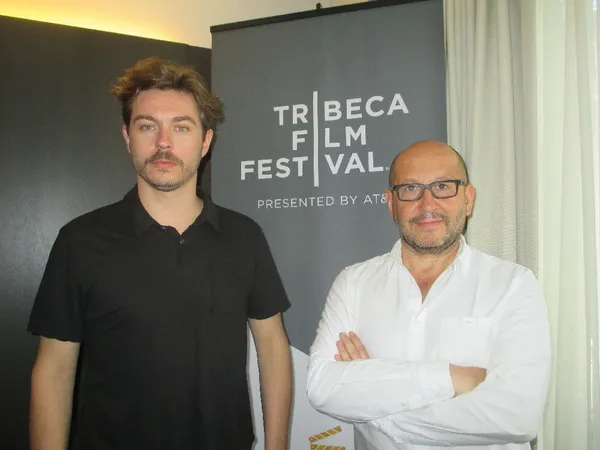 |
| Reset directors Alban Teurlai and Thierry Demaizière Photo: Anne-Katrin Titze |
In Reset (Relève), Thierry Demaizière and Alban Teurlai chronicle the path to the premiere of Benjamin Millepied's first ballet at the Opéra National de Paris in the fall of 2015. We hear composer Nico Muhly and the energetic young conductor Maxime Pascal discuss the quality of a lion's roar and the need for a "more menacing, dangerous piano." Designer for Lady Gaga, Tilda Swinton, Björk, and Scarlett Johansson, Iris van Herpen, whose tutus here are unorthodox, is specific about the colors, wanting "the black less black and the white a very light grey."
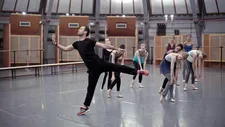 |
| Benjamin Millepied: "For American people, Benjamin is a Frenchman …" |
Millepied is known as the choreographer for Darren Aronofsky’s Black Swan, starring Natalie Portman, Mila Kunis, Winona Ryder and Vincent Cassel. Vincent Lindon, revolvers; Karl Lagerfeld, un roi seul and Robert Luchini, dit Fabrice on Fabrice Luchini were previously portrayed by Demaizière and Teurlai in the Empreintes series with Rocco coming up.
Reset is a marvelous look into the emotions at work for work. Millepied, after 20 years in the US, took over as Artistic Director in late 2014. He lets the filmmakers get very close to reveal some aspects of the creative process. Rehearsals, bureaucratic nuisances dealt with by his committed assistant, Virginie, a looming strike, how to get the stage to be a "Bob Wilson-style white box", concealed injuries, complicated wooden benches - the work environment is fascinating to watch.
We, so it seems, get to observe Millepied think, often with the help of screens. The constant presence of electronic devices to record and check and monitor and find inspiration for the new choreography, noticeably differentiates this dance film from many of the past.
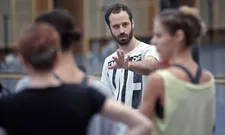 |
| "His look with the sneakers, the iPhone, his T-shirts - this is very modern and very American for us." |
The treasures here are in the details as we see Clear, Loud, Bright, Forward come to life at the Palais Garnier.
Anne-Katrin Titze: You are very close to the creative process in the film. We see someone think. When you see a choreographer think it adds an extra dimension. You have made portraits of artists such as Vincent Lindon…
Thierry Demaizière: Lindon, Karl Lagerfeld…
AKT: How is a choreographer's portrait different as far as creation is concerned?
TD: We made the film on two levels. The first one is the story of creation taking place. And the second one is doing a portrait of Benjamin standing up against the institution of the Paris Opera.
AKT: I noticed that Benjamin Millepied has a very interesting selection of T-shirts. I thought about them almost as silent ironic commentary. He has one that makes him look as though he has wings, torn and grey with red devilish wings. He has one that says BAM Next Wave, which ties it to his time here and Brooklyn. And a third one that says "Think of ME" [on the front] - "Thinking of YOU" [on the back]. Were you surprised by these shirts? Did you comment on them?
 2_225.webp) |
| "We have been there during three months and we tried to catch every moment." |
TD: For American people, Benjamin is a Frenchman and for French people Benjamin is an American in Paris. His look with the sneakers, the iPhone, his T-shirts - this is very modern and very American for us. And it goes against the tradition of the Opera.
Alban Teurlai: You are the first one to notice this!
AKT: I liked very much that you did without gossip. There are lots of dance films that show the creative process and then they go to the private life and show the toll it takes on the family, blah, blah, blah. You don't do that at all. You show Natalie Portman right at the start for a second.
Almost like Hitchcock who decided to have his cameo early on so that the audience doesn't wait for it. Is that why you were placing her there for a moment at the beginning?
AT: When we started the film, everybody around us told us about Natalie Portman, but it's not what we were interested in. That's why we chose to show her at the very beginning so we can move on and do something else afterwards.
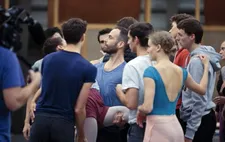 |
| "Benjamin told us that dance was always transmitted by memory." |
AKT: When I spoke with Frédéric Boyer, he pointed out your film especially as one he really liked. He also said that you were now working on a film about Rocco Siffredi. I did not know who he is but then found out that Catherine Breillat used him in Romance, right?
TD: Yes.
AKT: I suppose it's a bit different.
AT: Yes, quite.
AKT: What's the main difference?
AT: Before talking about the difference, we can talk about the similarities. It's all about bodies. Bodies at work. With Reset, it's dancers. In the film about Rocco it's about sexuality.
TD: Actors are like athletes in porn.
AT: In the movie with Rocco we would also like to show that the porn actors are also athletes. it was not the reason why we have chosen to make this movie but during the filming we discovered it.
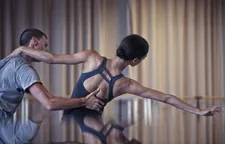 |
| "It pushes them to being beautiful in both, not just in contemporary dance." |
TD: The other thing is that there is no documentary on pornography in that respect - like we are portraitists and Rocco Siffredi is in porn what Mike Tyson is in boxing.
AKT: Now we can go back to dance. Your film also shows how choreography has changed drastically over the past few years - by having screens. We see Benjamin looking at the phone, the laptop, bigger screens - everything is now helped and changed by these screens. Can you talk a bit about how you were using the screens, how he is using the screens?
AT: At the beginning of the shoot, Benjamin told us that dance was always transmitted by memory. It's very new that the rehearsals are filmed, that the ballets are filmed. And we wanted to show this because it's quite new. Maybe ten years ago, it wasn't the case.
Dance has always been transmitted by voice, by drawings, by paintings but never by video. So it was important for us to show that it's something very new and that Benjamin uses this kind of communication.
_225.webp) |
| "It's all about bodies. Bodies at work. With Reset, it's dancers." |
TD: Even for dancers they use that to correct their positions and they film themselves with the iPhone in their hands and they can correct themselves after what they watched on video.
AKT: The only other ballet [besides the one newly created] we see in your film is La Fille Mal Gardée. I have a special love for it because it is the very first ballet I ever saw as a little girl live at the opera. In this case, the casting brings up the question of diversity. This is the first time a black dancer is seen as the lead character.
TD: It was a major point for Benjamin and a disagreement with French culture in that respect. Because for his American style it is impossible and unbearable not to have any coloured people in the corps de ballet. He thinks ballet is going to end and kills itself if it doesn't open itself to a multicultural French society.
AT: To be honest, there is diversity in the Paris Opera, there are black and Asian dancers but Benjamin thinks there are not enough. He thinks that the Opera is not moving fast enough compared to the way French society is moving. That's his major disagreement.
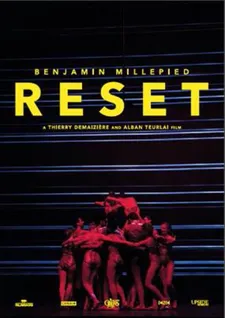 |
| Reset US poster |
TD: One of the examples is La Bayadère, there is a dance, it's called "The dance of the little negroes" and it's usually represented with kids in blackface. Benjamin wanted to change it. He also wanted to change the name to "The dance of the kids". But the unions at the opera protested and said, no, this is part of French history. In the US it had been changed for a long time. Only the Bolshoi and Paris kept this dance.
AKT: That's very interesting. It's a big conversation here too about what to keep and how to deal with offensive portrayals. Do you change, do you censor, or do you not and explain? Colour in another sense comes in with the costume designer. I loved the comment you captured. She wants "the black less black and the white, a very light gray." Composer Nico Muhly when he talks with the conductor has another beautiful line about a "menacing piano." How do the two of you select the dialogue you use?
AT: We have been there during three months and we tried to catch every moment. We had a lot of other moments like this but we couldn't put everything in the edit. It's a documentary, so nothing was rehearsed. Each time it was like a present they gave us. Because these are fantastic lines, as you say.
AKT: Do you sometimes fight about what goes in and what doesn't?
AT: During the editing? Sometimes. But at the end of the day, we decide to keep…
TD: We have a longer version. We talked a lot, for example, of the new dancers. We talked a lot about that. Who we include or not? What seems to be the most magnificent thing in the documentary is when Benjamin says his dancers are beautiful in contemporary dance but they lack inventiveness in the classic dance. And it pushes them to being beautiful in both, not just in contemporary dance.
Reset screened at the Tribeca Film Festival. The film opens theatrically in France on September 7 and in the US on November 18.





















